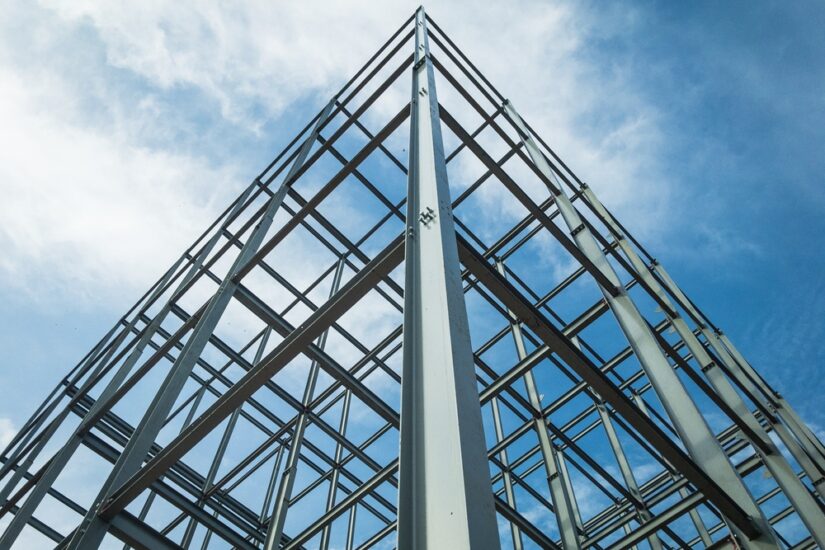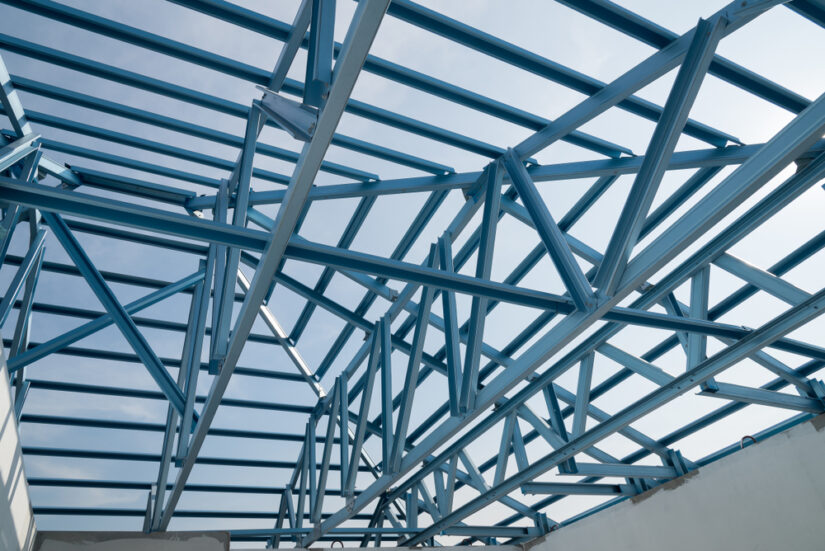
When constructing a metal building, the foundation is a critical component directly impacting stability, longevity, and overall costs. The complexity of a foundation can vary greatly depending on the size of the structure and the soil conditions of the building site. Cost-effectiveness is a key consideration during this phase, as the right choice of foundation can result in significant savings.
For steel buildings, the most affordable foundation option is typically a floating slab, also known as a slab on grade. This type of foundation involves a simple concrete slab that is poured directly onto the ground. The ground is first prepared and leveled, then a gravel base is laid down, followed by the concrete. This method is most suitable for smaller structures and locations with stable soil conditions and limited frost.
US Patriot Steel, as a supplier of premium steel buildings, often recommends this cost-effective foundation choice to its clients, provided the conditions are appropriate. They emphasize that while a floating slab is less expensive initially, the decision should always be based on the specific needs of the building project and the site to ensure the safety and durability of the structure.
Types of Foundations for Metal Buildings in 2025
Selecting a reliable and cost-effective foundation for metal building systems offers both financial and practical benefits. Reducing the overall construction cost without compromising on stability and durability is a key consideration. Here are the major types of metal building foundations to consider for your project in 2025:
Concrete Slab Foundations
Concrete slab foundations are a popular choice for steel buildings due to their stability and sturdiness. They consist of a flat, monolithic concrete pad poured directly onto the ground, which supports the weight of the structure. The preparation process involves grading and compacting the soil to create a level base, reinforcing with steel bars or mesh, and finally, pouring the concrete. The benefits of a concrete foundation include:
- Simplicity: A straightforward installation process that doesn’t require complex techniques.
- Durability: High resistance to weather elements and pests.
Gravel Pad Foundations
Gravel pad foundations are an economical alternative for smaller steel structures. These foundations are made by laying a bed of compacted gravel on the ground where the building will sit. They offer the following advantages:
- Cost-Effective: Materials and labor for a gravel foundation are typically less expensive than concrete.
- Quick Installation: The process is less labor-intensive and can be completed more quickly than pouring concrete.
Pier Foundations
Pier foundations, also known as footing or pile foundations, involve driving deep cylindrical columns into the ground to support the structure’s frame at strategic points. Key characteristics of pier foundations include:
- Reduced Material Use: Less material is required compared to a full concrete slab, lowering costs.
- Accessibility: Suitable for uneven terrain or sites where a traditional foundation would be impractical.
Perimeter Wall Foundations
A perimeter wall foundation is a sought-after choice for metal buildings, providing a continuous concrete wall around the structure’s base. This type of foundation offers excellent support, stability, and protection, especially in areas prone to flooding or shifting soil. It accommodates a variety of building sizes and designs while ensuring durability and structural integrity.
- Enhanced Stability: Provides a solid foundation for long-lasting support and resistance against shifting soil.
- Superior Protection: Helps safeguard the building from water intrusion and flooding.
Floating Slab Foundation
A floating slab foundation is a concrete slab that rests directly on the ground and is not anchored to footings. This design allows the foundation to “float” and adjust to soil shifts, making it ideal for areas with soft or expansive soil. The simplicity of its construction makes it a popular and cost-effective choice for metal buildings.
- Flexibility: Adapts to soil movements without cracking.
- Cost-Effective: Requires less material and labor compared to other foundations.
T-shaped Foundation
A T-shaped foundation consists of a reinforced concrete footing placed below the frost line, supporting walls above. This design is specifically engineered to prevent frost heave in cold climates. It provides a sturdy and durable base, making it a reliable option for metal buildings in regions with freezing temperatures.
- Frost Protection: Effectively resists frost heave and soil expansion.
- Durability: Provides long-lasting stability for structures in harsh climates.
Basement Foundation
A basement foundation involves creating a full basement beneath the structure, adding both storage and living space. This foundation is constructed with reinforced concrete walls and footings to support the load of the building above. It is an excellent choice for those seeking additional usable space in their metal buildings.
- Additional Space: Offers extra storage or functional areas like workshops.
- Versatility: Can be adapted for various residential or commercial uses.
Crawl Space Foundation
A crawl space foundation elevates the structure off the ground, creating a narrow area between the ground and the building’s floor. This type of foundation is beneficial for utility access and is commonly used in areas with poor drainage or sloped terrain. A crawl space foundation also helps improve air circulation under the building, reducing the risk of mold and moisture buildup.
- Utility Access: Easy access for plumbing, electrical, and HVAC systems.
- Moisture Control: Keeps the building elevated, reducing moisture issues.
Choosing the appropriate metal building foundation options requires an assessment of the specific needs of the steel building, taking into account factors like climate, soil type, and the intended use of the structure. Each foundation option, such as slab and perimeter foundations, offers a viable solution with specific considerations to weigh for a cost-effective, durable, and stable steel building.

Importance of a Solid Foundation for Metal Buildings
A solid foundation is vital for any metal building as it ensures structural stability, safety, and longevity. Without a strong foundation, even the highest quality metal structure can become unstable and prone to damage from environmental factors like shifting soil, heavy winds, or water damage. Here are the key reasons why a solid foundation is essential for metal buildings:
Integrity and Stability
The foundation is the base that supports the entire weight of the metal building, including the roof, walls, and interior features. A weak foundation can cause the structure to shift, leading to uneven floors, misaligned walls, and potential collapse.
Longevity of the Building
By providing a stable base, a good foundation helps prevent wear and tear on the building’s components over time. It reduces the risk of corrosion, water infiltration, and settlement issues that could otherwise lead to premature deterioration.
Performance in Extreme Weather
A properly designed foundation improves the building’s ability to withstand extreme weather conditions, including heavy rains, strong winds, and temperature fluctuations. It helps maintain the structural integrity of the metal building under various environmental stresses.
Investing in solid conventional building foundations ensures that metal buildings perform optimally, remain secure, and have a long service life.
Determining the Right Foundation
Choosing the correct foundation for a steel building is crucial for its stability and longevity. Factors like climate, soil condition, and the structural requirements of the building itself guide the selection process.
Regional Considerations
Climate: The local climate has a significant impact on the foundation choice. In areas with frequent freeze-thaw cycles, a foundation that can withstand expansion and contraction is essential.
Soil Condition: Soil types vary greatly, and the foundation must be suited to the specifics of the site. For instance, sandy soils may require deep foundations like piers or pilings, while clay-rich soils might need a reinforced slab to mitigate the risk of shifting.
| Soil Type | Foundation Recommendation |
| Sandy | Piers or Pilings |
| Clay | Reinforced Concrete Slab |
| Rocky | Surface Footings |
Building Requirements
Load-Bearing Capacity: A foundation must support the building’s weight. Foundation structural engineers will calculate the total load of the steel structure and recommend a foundation that can handle this load without excessive settlement.
Size and Design: The size and architectural design of the building also determine the foundation type. Larger structures may need more robust foundations like raft or mat foundations, which distribute the weight evenly.
- Single-story structures are metal building systems designed for less complex foundations.
- Multi-story buildings often need deeper, more complex foundations to account for additional loads.
By considering regional factors and the specific requirements of pre-engineered metal buildings, one can determine the most cost-effective and suitable foundation for a steel structure. It is advisable to consult with a structural engineer or building supplier to ensure the foundation is appropriately designed for the individual conditions of the site and building.
US Patriot Steel’s Expertise in Action
US Patriot Steel excels in offering advanced steel building foundation systems through their comprehensive design, fabrication, and installation services. Their dedicated approach ensures efficient and economical solutions tailored to each project.
Design and Fabrication Services
US Patriot Steel provides customized foundation design and fabrication services for steel buildings, emphasizing affordability without compromising on quality. Clients can learn more about US Patriot Steel’s steel building design services through consultations that consider budget and functional requirements.
- Design Solutions: Designing metal building foundations tailored to individual needs, incorporating cost-effective foundation options.
- Fabrication Process: Streamlined and precise, reducing material waste and costs. Clients are encouraged to explore US Patriot Steel’s steel building fabrication process to understand the efficiency and cost savings that contribute to affordable foundation solutions.
Professional Installation
Discover the benefits of professional steel building installation by US Patriot Steel, which ensures that the foundation and overall structure are built to last. Their team brings years of experience to each project, critical to efficient and effective construction.
- Installation Expertise: US Patriot Steel’s skilled technicians have a track record of completing projects on time and within budget.
- Foundation Selection Assistance: With a deep understanding of various foundation types, they assist in selecting and implementing the cheapest foundation solution that is also appropriate and reliable for the long term.
To request a free custom quote, call US Patriot Steel at (866) 750-2197 or fill out this online contact form.